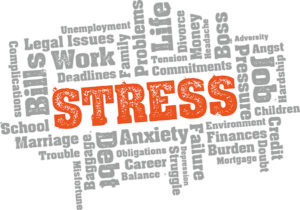Living with anxiety can be challenging, especially in a world where we’re constantly surrounded by new information. Never-ending streams of news, social media, and instant messaging can make it nearly impossible to disconnect, compounding feelings of stress and anxiety.
If you have been diagnosed with an anxiety disorder or find yourself dealing with anxious feelings, these tips for coping with anxiety can help you begin to feel better.

1. Take a Break from Social Media and News
Nearly everyone has a smartphone these days, connecting us to friends, family, and news at all times. With all the changes wrought by COVID-19 and civil unrest over the course of the last year and a half, spending too much time engaging with this information can cause a significant increase in anxiety.
Make a point to put your phone down for a couple of hours each day and switch off the news. Just because your phone allows you to be instantly accessible doesn’t mean you have to be accessible all the time.
2. Get Moving
Experts recommend 30 minutes of physical activity three to five times a week to improve both physical and mental health. Finding your favorite way to exercise can help you focus on your body instead of racing thoughts.
Remember, exercise doesn’t have to be strenuous or difficult. Take a walk outside, try a yoga class with friends, or dance it out. Just get your heart rate up and your body moving.
3. Try Breath Exercises or Meditation
Taking slow, deep breaths signals to your brain that you’re okay when it goes into overdrive. You can start out with five deep breaths or try some more complex breathing exercises specifically designed for coping with anxiety.
Guided mindfulness and meditation exercises can also help you learn how to deal with anxiety in the moment. Check out apps like Headspace or Calm or look up some exercises up on YouTube.
4. Practice Good Sleep Hygiene
We’ve all heard the recommendations to get seven to nine hours of sleep each night. While this is always a good benchmark, you also need to consider how well you’re sleeping and what you’re doing before bed.
Turn off all screens at least half an hour before you go to sleep and make sure you’re avoiding caffeine and alcohol later in the day, as well. Start a simple calming bedtime routine to signal to your mind and body to begin preparing for sleep. Mind racing when it’s time to sleep? Try a worry log earlier in the day to give your brain an opportunity to address those thoughts before bedtime. Doing these things can make it easier to fall asleep and kick nighttime anxiety to the curb.
5. Use a Grounding Exercise
Breathing exercises are useful but are even more powerful when paired with grounding exercises. Practicing these exercises reminds you to be in the moment and can help you quiet intense emotional distress.
The five senses exercise is a particularly good one for helping calm anxious thoughts. To do this exercise, you’ll need to look around you and identify:
- 5 things you can see
- 4 things you can feel
- 3 things you can smell
- 2 things you can hear
- 1 thing you can taste
While they don’t necessarily need to be in that order, it’s important to focus on all five of the senses somewhere throughout the exercise.
6. Place Your Focus on What You Can Change
One reason for anxious thoughts is fear of what is going to happen; ultimately, though, there’s only so much that you have control over. This is one reason why the Serenity Prayer has been adopted into Alcoholics Anonymous and other similar groups.
Recognizing what you can’t change or control and focusing instead on what you can is a good strategy for coping with anxiety. It allows you to shift your focus so you can take action on the things you can control, such as your own behaviors and responses.
7. Practice Self-Care
Self-care looks different for everyone. For some, it may mean taking a bubble bath with candles. For others, it could be getting together with friends to play a game and blow off some steam. Still others may seek spending time in nature. Whatever feels right for you, spending time doing the things that fill your cup back up is critical for reducing stress and anxiety.
Schedule time into your day to take care of yourself and stick to it.
While these tips can certainly help when it comes to coping with anxiety, talking with a professional is also a powerful tool. If you feel that anxiety is taking over your life or that you’re having trouble coping on your own, please reach out. Our team is here to help. You can contact us online or give us a call at 410.760.9079.
